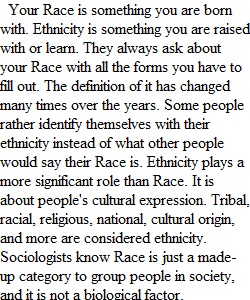


Q Getting Started Why does it seem that Americans, as well as citizens in other countries, focus so much on race or ethnicity? Why, given the fact that many of our early settlers came to the new country to get away from religious and other types of persecution, do people continue to judge others so harshly based on biological, cultural, or religious differences? Just because someone recognizes persecution and takes steps to avoid prejudice and discrimination doesn’t mean that they don’t perpetuate the same types of injustices. This is one of the unfortunate sides of human nature. According to sociologists, race is more than categorizing people; it is also a way to maintain social stratification. You will explore the conceptualization of race, as well as ethnicity and privilege, in this assignment. This assignment gives you the opportunity to really dig into the important concepts of race, ethnicity, stratification, and privilege. How might your perception and thinking of these concepts change after you read about them and complete this discussion? As these are very important concepts in society, you are encouraged to reflect deeply on the sociological investigation of them, as well as how your own understanding of them might change. Upon successful completion of this discussion, you will be able to: • Distinguish between “race” and “ethnicity.” • Discuss solutions to prejudice and discrimination in today’s society, including a Christian perspective. ________________________________________ Background Information Do you know that there is no biological basis for the concept of race? Rather, it is a socially constructed concept. In fact, according to DNA research and testing, there are more differences among groups who overtly look or appear similar than those who appear very different. So why is society so focused on racial categories? And can research also help us explain how different people think about race and how that changes over time? You will explore this in more detail in this workshop. Sex and gender, while often used interchangeably, are actually different concepts. Sex refers to our biology, while gender refers to how the different sexes behave and what they do. Gender stratification, similar to racial stratification, is about power differentials. And like race, our understanding of sex and gender has evolved over time. The sociological study of religion can open new venues for exploration and critical thinking about this concept. It is important to keep an open mind when discussing this topic; you are encouraged to set aside your personal views about religion and see what sociology can offer about the topic. ________________________________________ Instructions 1. Review the rubric to make sure you understand the criteria for earning your grade. 2. In your textbook, Sociology: A Christian Approach for Changing the World, read: a. Chapter 8, “Race and Ethnic Stratification” b. Chapter 9, “Gender and Society” c. Chapter 11, “Marriage and Family” d. Chapter 12, “Religion” 3. Download and review the following textbook PowerPoint presentations: a. Chapter 8(PowerPoint presentation) b. Chapter 9(PowerPoint presentation) c. Chapter 11(PowerPoint presentation) d. Chapter 12(PowerPoint presentation) 4. Navigate to the threaded discussion and respond to the following discussion prompts: a. What is the difference between race and ethnicity, and why do sociologists tend to argue that race is a social, not biological, factor? b. What unearned disadvantages have you faced in your life? What unearned advantages have you had? c. Discuss at least two solutions to prejudice and discrimination in our society. d. What can Christians do to help diminish the racialization of society? 5. Your initial post is due by the end of the fourth day of the workshop. 6. Read and respond to at least two of your classmates’ postings, as well as all follow-up instructor questions directed to you, by the end of the workshop. 7. Your postings should also: a. Be well developed by providing clear answers with evidence of critical thinking. b. Add greater depth to the discussion by introducing new ideas. c. Provide clarification to classmates’ questions and provide insight into the discussion. d. Be posted on three different days during the workshop.
View Related Questions